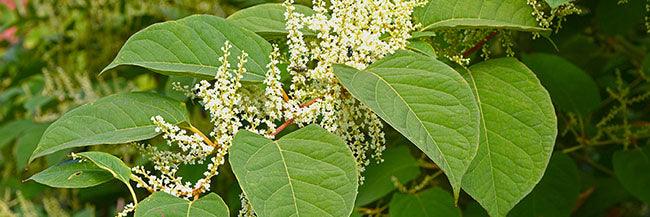QUICK FACTS
Scientific name: Polygonum cuspidatum
Other names: Hu zhang (Chinese), Kojo (Japanese), Mexican bamboo, Fallopia japonica, Reynoutria japonica
Location: Native to Japan and China, but now grows worldwide in temperate climates
Known for: An excellent source of trans-resveratrol, the active form of resveratrol that is more readily absorbed by the body
Part Used: Rhizomes (roots)
Fun fact: Japanese knotweed was originally carried from Japan and China to Great Britain to be used as an ornamental garden plant.
Good for: Fighting chronic infections, microbiome balance, immune health, cardiovascular support, liver protection, brain health
Key Properties & Actions: Antibacterial, antiviral, antifungal, anti-inflammatory, antioxidant, cardioprotective, neuroprotective, hepatoprotective, immunomodulator, antitumor
What is Japanese Knotweed?
A good word to describe Japanese knotweed is tenacious. Native to Japan and China, it was carried to Great Britain for use as an ornamental garden plant. From there, it was brought to Canada, the United States, and New Zealand, where it is now considered a rapidly expanding invasive.
Japanese knotweed is an attractive plant that looks like bamboo but with broad leaves. Once planted, the rhizome (root) expands rapidly, pushing out any other plants in the vicinity.

While horticulturists have declared war on this invasive, herbalists are
celebrating. Those tenacious rhizomes contain potent bioactive substances like trans-resveratrol, an active form of resveratrol (an age-defying and life-enhancing compound) that is best absorbed and utilized by the body.
Beyond resveratrol, Japanese knotweed contains a wide spectrum of chemical compounds offering impressive benefits. Together, these substances offer antimicrobial activity, immune balance, cardiovascular support, antioxidant and anti-inflammatory benefits, liver protection, and nerve protection.
Benefits of Japanese Knotweed and How It Works
Source of Resveratrol
Resveratrol is a natural antioxidant found in red wine, grapes, and the roots of Japanese knotweed. Modern research has shown this compound to contain strong anti-inflammatory and antioxidant activity, as well as properties that offer protection to the cardiovascular system and immune system.1
Trans-resveratrol is the chemical form of resveratrol best absorbed and utilized by the body. While red grapes are high in resveratrol, it must be converted into trans-resveratrol in the body. Japanese knotweed contains mostly trans-resveratrol, making it a preferred source of the compound.
Antimicrobial Support
Japanese knotweed is a systemic antimicrobial providing activity against a wide range of bacteria, viruses, protozoa, and yeast. Japanese knotweed contains phytochemical constituents that are known to pass across the blood-brain barrier, raising interesting therapeutic possibilities for brain health and the imbalances of the brain microbiome.
Recent in vitro research out of John Hopkins University (JHU) supports the anecdotal findings of the clinical use of Japanese knotweed for combating tick-borne diseases.
A 2020 JHU study found Japanese knotweed to be highly active against Borrelia burgdorferi, a bacteria that causes Lyme disease.2 While another study published in 2021 demonstrated the herb’s ability to inhibit Babesia duncani, a parasite acquired from ticks that sometimes presents as a coinfection alongside Lyme disease.3
Beyond this impressive emerging research on tick-borne diseases, many other studies also demonstrate Japanese knotweed’s ability to fight various microbes.
A 2013 in vitro study showed that Japanese knotweed can inhibit Aspergillus fumigatus, a mold that can cause allergic reactions and respiratory illness, as well as Staphylococcus aureus, a staph bacteria that is normally harmless but under the right conditions can cause an antibiotic-resistant infection.4
Emodin and resveratrol are two of the phytochemicals found in Japanese knotweed roots that have antiviral activity. These bioactive compounds have shown in vitro activity against Epstein-Barr virus (EBV), SARS-CoV-2, human immunodeficiency virus type 1 (HIV-1), and more.5
Immune Balance
Japanese knotweed is recognized as an immunomodulator, meaning it can calm overactive portions of the immune system while also boosting immunity against pathogens. It is especially useful for balancing immune system functions disrupted by chronic stress and microbes.
In a 2015 animal study, healthy mice were given a Japanese knotweed extract for three weeks to assess its effects on the immune system. The researchers found that the Japanese knotweed extract stimulated immune cells and enhanced immune functions like phagocytosis, a cellular process that can help destroy harmful microbes.6

Cardiovascular Support
Resveratrol offers significant cardiovascular benefits, including support for optimal heart function, enhanced blood flow via dilation of blood vessels, enhanced integrity of blood vessel walls, and reduced blood viscosity (thickness).
In a 2014 randomized human clinical trial, a combination of Japanese knotweed extract and hawthorn extract was found to inhibit atherosclerosis as effectively as a statin medication. The authors suggested this effect was due to the herb’s anti-inflammatory actions and ability to reduce tissue damage.7
Anti-Inflammatory and Antioxidant Activity
Japanese knotweed possesses potent antioxidant and anti-inflammatory properties that protect the brain, gastrointestinal tract, nervous system, and liver.
In a 2020 animal study, Japanese knotweed extract demonstrated its ability to protect stomach lining and reduce stomach ulcers through its anti-inflammatory and antioxidant activity.8
Japanese knotweed can also be helpful in counteracting the inflammation and oxidative stress that can sometimes accompany physical exercise.
In a 2013 double-blind, placebo-controlled human clinical trial, researchers gave 20 healthy male professional basketball players 200 mg of Japanese knotweed extract standardized to 20% trans-resveratrol daily for six weeks.
After six weeks, inflammatory markers were significantly reduced in those taking the supplement, while those taking the placebo had no observable change. A suggested mechanism of action was the inhibition of pro-inflammatory pathways like NF-κB.1
Brain Health
Japanese knotweed and its key phytochemical resveratrol offer a wide range of benefits to the brain.
Resveratrol can help balance the HPA axis (a complex feedback system that regulates the body’s reaction to stress), reduce inflammation and oxidative stress in the brain, enhance the growth of new nerve tissue, and increase neurotransmitter production.9
These mechanisms can help to improve mood and cognitive functions, protect the brain from excessive aging, and more.
Resveratrol can also increase brain-derived neurotrophic factor (BDNF), a protein that plays a pivotal role in neuroplasticity and overall brain health.
A 2015 animal study assessed the effect resveratrol had on decreased BDNF and depressive-like behaviors due to stress. The study found that resveratrol mitigated these effects by regulating the HPA axis and increasing brain levels of BDNF.10
Additionally, in vitro studies show that resveratrol can reduce amyloid beta, the primary component of plaques found in the brains of Alzheimer’s patients.9 While the jury is still out on the exact role of amyloid beta buildup in the progression of Alzheimer’s, Japanese knotweed may be an important herb to keep an eye on.
History & Traditional Use
Japanese knotweed has an extensive history of traditional use in both China and Japan for infections, inflammation, liver issues, and skin issues.11
The root is listed in the Chinese Pharmacopoeia, an official compilation of traditional Chinese and western medicines. In traditional Chinese medicine, the root is used to support the liver, promote blood circulation, and support the respiratory system.12

Japanese knotweed is also used as a food in many Asian countries, often being compared to asparagus or rhubarb. In China and Japan, the young shoots are harvested and preserved in salt or cooked fresh.
Additionally, Japanese knotweed is prepared and consumed as a tea in China and Japan. This form of preparation is known as itadori, a Japanese word that translates to “removes pain”.13
How to Use and Dosing
The general suggested dosage for a Japanese knotweed powdered extract is 200-800 mg (standardized to 50% trans-resveratrol) two to three times daily.
If using a tincture, general dosing is 1-2 mL up to three times daily.
For added cardiovascular support, Japanese knotweed can be combined with other herbs like hawthorn, garlic, ginkgo, gotu kola, and reishi mushroom.
To support immune function and balance the microbiome, Japanese knotweed combines well with andrographis, berberine, cat’s claw, Chinese skullcap, and garlic.
Interactions
Caution is advised if also taking anticoagulant medications because resveratrol has blood-thinning properties.
Always check with your health care practitioner before use if you are taking medications. For more general education on potential interactions between herbs and medications, check out Dr. Bill Rawls’ article: Is it Safe to Take Herbs with My Medications?
Precautions & Side effects
Side effects are rare, with a low potential for toxicity. Japanese knotweed has been used in traditional forms of Asian medicine for thousands of years and offers a high level of safety. Check with your health care provider before using Japanese knotweed if you are pregnant or nursing.
Disclaimer: This information is intended only as general education and should not be substituted for professional medical advice. Any mentioned general dosage options, safety notices, or possible interactions with prescription drugs are for educational purposes only and must be considered in the context of each individual’s health situation and the quality and potency of the product being used. Use this information only as a reference in conjunction with the guidance of a qualified healthcare practitioner.
Want to See the Science? Check Out Our References Below.
1. Zahedi HS, Jazayeri S, Ghiasvand R, Djalali M, Eshraghian MR. Effects of polygonum cuspidatum containing resveratrol on inflammation in male professional basketball players. Int J Prev Med. 2013;4(Suppl 1):S1-S4.
2. Feng J, Leone J, Schweig S, Zhang Y. Evaluation of Natural and Botanical Medicines for Activity Against Growing and Non-growing Forms of B. burgdorferi. Front Med (Lausanne). 2020;7:6. Published 2020 Feb 21. doi:10.3389/fmed.2020.00006
3. Zhang Y, Alvarez-Manzo H, Leone J, Schweig S, Zhang Y. Botanical Medicines Cryptolepis sanguinolenta, Artemisia annua, Scutellaria baicalensis, Polygonum cuspidatum, and Alchornea cordifolia Demonstrate Inhibitory Activity Against Babesia duncani. Front Cell Infect Microbiol. 2021;11:624745. Published 2021 Mar 8. doi:10.3389/fcimb.2021.624745
4. Zhang L, Ravipati AS, Koyyalamudi SR, et al. Anti-fungal and anti-bacterial activities of ethanol extracts of selected traditional Chinese medicinal herbs. Asian Pac J Trop Med. 2013;6(9):673-681. doi:10.1016/S1995-7645(13)60117-0
5. Jug U, Naumoska K, Malovrh T. Japanese Knotweed Rhizome Bark Extract Inhibits Live SARS-CoV-2 In Vitro. Bioengineering (Basel). 2022;9(9):429. Published 2022 Sep 1. doi:10.3390/bioengineering9090429
6. Chueh FS, Lin JJ, Lin JH, Weng SW, Huang YP, Chung JG. Crude extract of Polygonum cuspidatum stimulates immune responses in normal mice by increasing the percentage of Mac-3-positive cells and enhancing macrophage phagocytic activity and natural killer cell cytotoxicity. Mol Med Rep. 2015;11(1):127-132. doi:10.3892/mmr.2014.2739
7. Liu LT, Zheng GJ, Zhang WG, Guo G, Wu M. Zhongguo Zhong Yao Za Zhi. 2014;39(6):1115-1119.
8. Kim YS, Nam Y, Song J, Kim H. Gastroprotective and Healing Effects of Polygonum cuspidatum Root on Experimentally Induced Gastric Ulcers in Rats. Nutrients. 2020;12(8):2241. Published 2020 Jul 27. doi:10.3390/nu12082241
9. Moore A, Beidler J, Hong MY. Resveratrol and Depression in Animal Models: A Systematic Review of the Biological Mechanisms. Molecules. 2018;23(9):2197. Published 2018 Aug 30. doi:10.3390/molecules23092197
10. Ali SH, Madhana RM, K V A, et al. Resveratrol ameliorates depressive-like behavior in repeated corticosterone-induced depression in mice. Steroids. 2015;101:37-42. doi:10.1016/j.steroids.2015.05.010
11. Peng W, Qin R, Li X, Zhou H. Botany, phytochemistry, pharmacology, and potential application of Polygonum cuspidatum Sieb.et Zucc.: a review. J Ethnopharmacol. 2013;148(3):729-745. doi:10.1016/j.jep.2013.05.007
12. Zhang H, Li C, Kwok ST, Zhang QW, Chan SW. A Review of the Pharmacological Effects of the Dried Root of Polygonum cuspidatum (Hu Zhang) and Its Constituents. Evid Based Complement Alternat Med. 2013;2013:208349. doi:10.1155/2013/208349
13. Burns J, Yokota T, Ashihara H, Lean ME, Crozier A. Plant foods and herbal sources of resveratrol. J Agric Food Chem. 2002;50(11):3337-3340. doi:10.1021/jf0112973
14. Rege SD, Geetha T, Griffin GD, Broderick TL, Babu JR. Neuroprotective effects of resveratrol in Alzheimer disease pathology. Front Aging Neurosci. 2014;6:218. Published 2014 Sep 11. doi:10.3389/fnagi.2014.00218
15. Guan SY, Zhang K, Wang XS, et al. Anxiolytic effects of polydatin through the blockade of neuroinflammation in a chronic pain mouse model. Mol Pain. 2020;16:1744806919900717. doi:10.1177/1744806919900717
16. Ghanim H, Sia CL, Abuaysheh S, et al. An antiinflammatory and reactive oxygen species suppressive effects of an extract of Polygonum cuspidatum containing resveratrol. J Clin Endocrinol Metab. 2010;95(9):E1-E8. doi:10.1210/jc.2010-0482
17. Ma X, Leone J, Schweig S, Zhang Y. Botanical Medicines With Activity Against Stationary Phase Bartonella henselae. Infectious Microbes and Diseases. 2021;3(3):158-167. doi:10.1097/im9.0000000000000069



